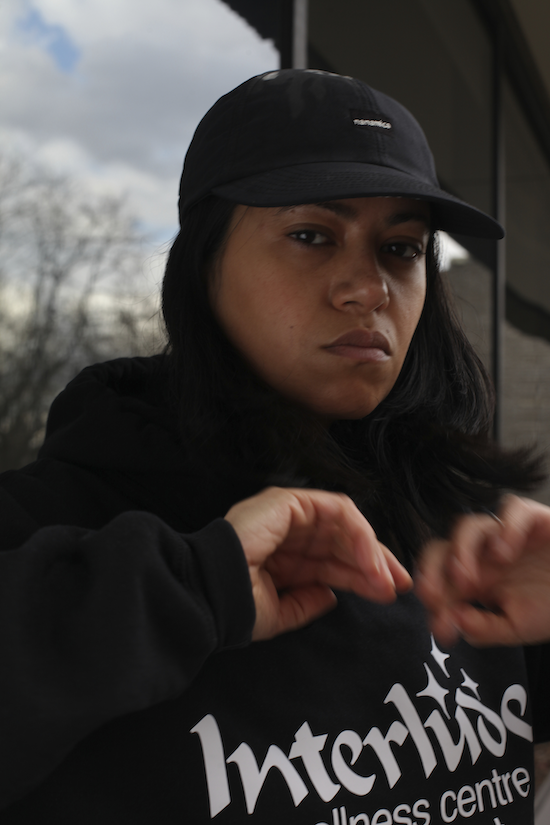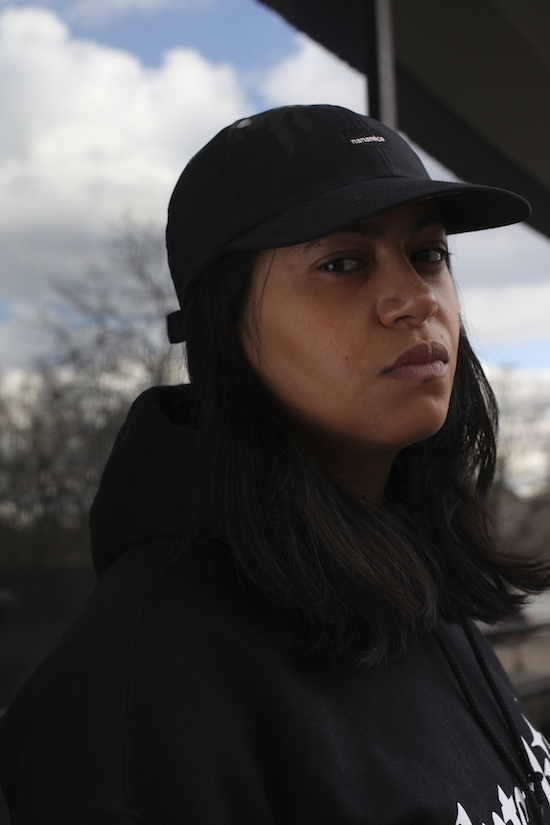Photos by Lizzy Nicholson
Sara Chen’s Ikonika project has been one of Hyperdub’s staples for more than a decade. "Hyperdub feels like home to me. Every artist has their own little niche. We’re kind of like cartoon characters. We all have our special moves, powers and different personalities," Chen says. Her intriguing discography, a microcosmos of UK club sounds of the past decade and beyond, is full of curveballs. Expending on the tropes of UK drill, grime, dubstep, R&B, UK funky, dancehall, amapiano, gqom and other club genres from around the globe, she has forged a distinctive style, releasing three acclaimed LPs for Hyperdub and many singular rollers to set dancefloors ablaze. But while her last Hypedub EP was more of a UK drill, dancehall and grime affair, contrasting that same year’s techno-indebted Bodies EP for Don’t Be Afraid, her latest outing Bubble Up pushes matters deeper into pop territory. Apart from being her first release to feature her own vocals, it is also her "coming out" record featuring "queer love anthems for the dance floor".
"I’m not sure how long I can release music or DJ for, so I wanted to come out while I’m still releasing,” she says. “For me growing up, and even now, I didn’t have many role models who look like me, are queer like me, make music like me. So I’m just thinking if someone sees Ikonika as a DJ, producer, composer, performing artist, and she’s queer and brown, this is a vital thing. I should be visible and I should be representing. I wanna be known as somebody that did it and was there all this time.” She continues: “I really admire the younger generation for being so outspoken and active. They’re just like, fuck you, we’re not gonna do that. I felt like I couldn’t do that. It was all about how to navigate these cis, white male spaces. It should have just been me creating my own space, my own lane.” Fortunately, recent developments in club culture have resulted in a more inclusive environment. "It’s just incredibly inspiring to me. I feel like I couldn’t really do that five, ten, fifteen years ago. It makes me feel part of a community and a scene. I’ve learnt there’s plenty of space for all of us. This is something to think about while moving forward.”
Though some may associate her with the dubstep scene, she has always felt more drawn to UK funky. "It just stuck with me because it was the first type of house music I got into. The fact that it was from London just really did something to me. For me, it never really died. I always play at least one classic tune in my sets. And there was always a funky influence in the background of my songs, maybe more so than dubstep. I have a weird relationship with dubstep.” Interestingly, as trends in clubland bring a resurgence of interest UK funky-flavoured grooves. "I feel like now all the dots are joining nicely, especially with the South African influence and regional stuff from the States like Jersey Club." She also maintains an interest in the development of ampapiano, "and the way it’s mutated into a kind of Bacardi house sound, which was very influential for UK funky,” she says. The genre is associated with South African artists like the late DJ Spoko, the influential producer best known for pioneering the genre, and his protégé DJ Mujava, who had a big crossover hit called ‘Township Funk’. "Actually, that was the first track I ever remixed. It came out on Warp in 2009," Chen says. "Just seeing the way amapiano has mutated, and how it’s gone back to Bacardi house and even incorporated some kwaito influences, these are all things I’m very interested in. The sounds they choose are like the sounds I choose. I can relate to it, I understand where they’re coming from. I’m able to enjoy the music and feel influenced again."
Talking about the "UK sound", a descriptor that can feel a bit vague to outsiders, Chen shares an interesting point of view. "There’s more of a conversation now, particularly between the UK and South Africa. So we can say UK amapiano because we’re messing around with the BPM. We have this tendency to make things faster and harder because our crowds are a little bit different. I think maybe amapiano is more like lounge house music. But it does tend to fall into a kind of techno category, and I think we’ve kind of gripped onto that bit. We’ve built a harder, darker sound.” One of the main constituents of her current sound palette is the rhythmelody of the log drum. Unlike in the case of its South African predecessor where the log drum sample comes from the DAW Fruity Loops, she uses her vintage Yamaha. "I’ve been familiar with the log drum for a while ’cause of my DX7. I like it ’cause it’s very melodic and has a very nice sub to it. Sometimes I just want my bass to be awake, have some presence and cut through the mid-range."

Admittedly, Ikonika dipped her toes into UK amapiano and gqom mutations a few times before with tracks like ‘Kicks Count’, the Adult Swim-released ‘No Way’ and ‘Show Me’ from the last Club Djembe compilation. But on Bubble Up, she explores the potentials of blending UK amapiano, vocal Chicago house trax and early Detroit hi-tek soul even further. Her new EP is also a deeply personal affair, with her voice claiming the foreground for the first time. While it might be assumed that her R&B upbringing prompted this decision, she in fact cites her love of Róisín Murphy. “I remember her album [Róisín Machine] came out during lockdown, and she did this lockdown session from her Ibiza home. I saw it and was just totally blown away because I love how wacky she is. She’s very comfortable in her own skin. That made me think about maybe singing on a track. She was basically a role model to me, and I’m like, maybe I’d quite like to do that."
While Murphy may be a prime inspiration, her vocals, full of coos, whispers, oohs and ahhs, also brings to mind the haziness of Chicago trailblazers à la Jamie Principle. There is something soothing and hypnotising in her yearning low key delivery. Even when she employs certain tropes and recognisable ad libs, she does so in her own distinct way. "I noticed a lot of gqom or amapiano tunes have a "hu" or something, and I didn’t want it to be generic. We’ve all downloaded the same sample pack. I just felt like it was getting rinsed so I wanted to use my own voice for those kinds of sounds but it didn’t work out. For the title track, I just ended up singing the phrase and then I bounced it." Her DJ friends played an important role in the process, encouraging her to go even further down this road. "I thought maybe I’ll try singing a little bit more. I didn’t feel the need to write complete songs ’cause I was still new to it. I’m not really balanced like a pop singer. I know my range. I just wanted to treat it as any kind of sample, to have that mentality where it’s like a drum hit or something. So lots of yays, heys, you know, one liners. I wanted these tunes to bang on the dancefloor," says Sara. This new approach opened her music to new possibilities. "Rather than being this shy, introverted DJ/producer, I can say stuff now and I know how to say it, how to record it, how to mix it down, how to arrange it and whatnot."
Even though her productions boast various layers of interlocking percussion, bass, pads, synths and vocals, the underlying sense is one of simplicity. "The first thing I listen to in a track is the beat. The second thing’s the hook. I really don’t care much for everything else. It’s just my DJ/producer-mind working. I just wanted to go straight to the point and just have a hook and maybe a pre-chorus or post-chorus. That’s the only thing I’m kind of interested in for the moment," says Sara. If tracks like ‘When You Look At Me’ and ‘Dirty Tetris’ opt for a more vibey deep house mood, the banger ‘Energy’ is pretty much self-explanatory. "That’s actually one of my favourite tunes to play out when I DJ because no matter what type of crowd I play it to, that one just seems to resonate with people. And it’s not even been released yet! It’s a lovely feeling," she says.
She recently premiered the Bubble Up live show at Berghain’s Panorama Bar. "It was always on my list," she says. The live show represents a new stage in her career. "There’s a lot to think about. But the setup is very simple. It’s just CDJs, a mixer and my vocal processor, which has some auto tune, a voice doubler and a delay. The auto tune is there just for my anxiety. I might have a real Mariah Carey moment and I don’t wanna be caught out," says Chen. "It’s just super fun because sometimes when I DJ I feel like I’m detached from the interaction with the crowd. I’m very excited to play more live shows. I’m now able to DJ and multitask all these things whilst still singing over the top within the blend. I wanna present my catchy dancefloor songs to a wider audience," she says. Currently, she is working on new material featuring more vocals. "I’m challenging myself, maybe not necessarily to use verses but use more of my vocals to tell more of a story ’cause I think now might be the time. I’m very into making tunes at the moment, and I don’t want to lose that momentum. I’m very fortunate that I don’t have many blocks but I feel like I might be due for one. So I want to rinse this energy as much as I can."
Ikonika’s new EP Bubble Up is released on November 25 via Hyperdub


